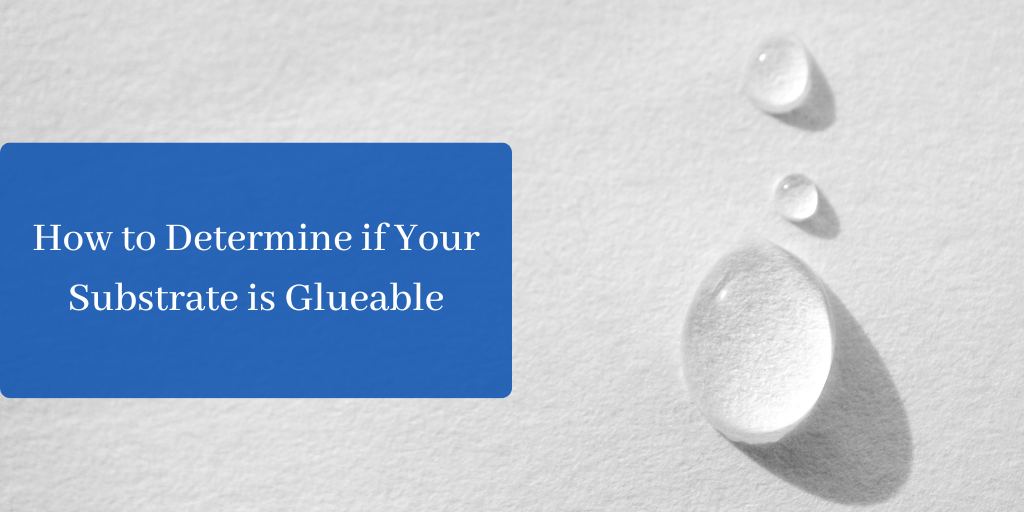In the world of adhesives, finding the right glue for paper, paperboard, and chipboard can be challenging. We often hear the question—what glue will work with this substrate?
The answer is not a simple yes or no. We understand the complexity of adhesive compatibility, and this article will cover substrate testing processes.
Reviewing Your Equipment and Application Speed
When working with paper-based substrates, gelatin and liquid-based glues are commonly used. However, each is suited for different types of equipment and application processes. Review the operational speed of your equipment recommended by the manufacturer.
The speed of the glue application can greatly impact the ultimate bond strength. Applying glue too quickly can prevent it from properly penetrating the substrate, and too slowly can lead to excessive absorption. Maintaining proper glue speed application is critical to ensuring a consistent bond.
The Water Drop Test
When focusing on the initial glueability of a substrate, an easy and insightful test is the water drop test. It involves placing a droplet of water onto the surface of the substrate and watching how the water behaves.
The results can provide a useful but basic understanding of the substrate's ability to absorb or repel water.
- If the water drop is absorbed into the substrate, spreading and wetting the surface, it suggests the substrate has good absorbency. This characteristic is generally favorable for adhesive bonding, as the adhesive can penetrate and bond effectively.
- If the water drop remains on the surface without being absorbed, the substrate may be less porous or have a water-resistant surface. This could make bonding more challenging, as the adhesive may not easily penetrate the substrate.
This simple test is helpful for identifying substrates with high absorbency, which are generally well-suited for adhesive bonding.
Dyne Testing: Finding Surface Energy for Adhesion
Dyne tests play a crucial role in evaluating materials for adhesion.
This method is used to determine the surface energy of a material. Surface energy is a measure of how well a material's surface can support adhesion, and it is often expressed in dynes per centimeter (dyn/cm).
The dyne test helps determine whether a substrate's surface is adequately prepared to support adhesion, especially in applications involving the application of adhesives.
Glue-Up Tests: Revealing Bonding Compatibilities
Glue-up tests provide additional insight into the bonding capabilities of glues to substrates and help determine the setting speed of materials. Generally, the test is performed by cutting a small piece of each substrate and gluing them together. The test pieces are left at room temperature for 24 hours before being attempted to be pulled apart.
You can see if a complete permanent mechanical bond was formed through careful evaluation. A successful bond means you can identify fiber tear, indicating a complete permanent bond was created.
Heat and Humidity Tests for Longevity
The surrounding environment can significantly impact how adhesive bonds are formed. Heat and humidity tests are conducted to help measure the amount of curl between the glue and a substrate or determine how well a bond will hold under extreme conditions.
After bonding, substrates are placed in a humidity chamber at the desired temperature and humidity. Typical testing temperatures range from room temperature to 120°F but can be higher depending on the glue, and humidity can reach 100% if needed. A typical time frame for testing is 24 hours. The substrates are then removed from the chamber, and the bond is evaluated.
Heat and humidity tests are a crucial step in assessing the durability and reliability of adhesive bonds, especially in applications where exposure to elevated temperatures and high humidity levels is expected.
Still Having Adhesive Bonding Issues?
In the world of ever-changing substrates and glues, having an expert to advise on adhesives can help. If you need assistance with testing your adhesive or substrate, LD Davis has in-house testing at our facility in North Carolina.
Whether facing challenges with paper adhesion or exploring new applications, trust LD Davis to guide you through the intricate world of adhesive selection. Contact us today, and let's embark on a journey of adhesive excellence together.



